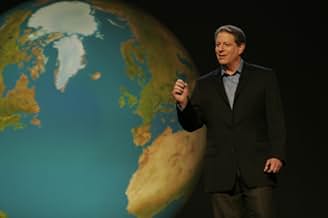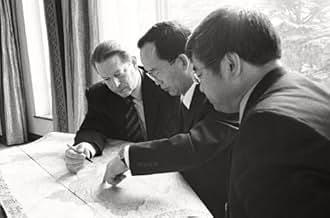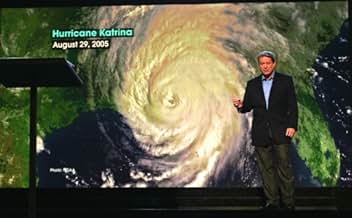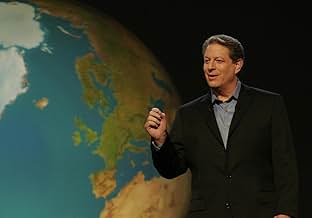IMDb RATING
7.4/10
86K
YOUR RATING
Filmmaker Davis Guggenheim follows Al Gore on the lecture circuit, as the former presidential candidate campaigns to raise public awareness of the dangers of global warming and calls for imm... Read allFilmmaker Davis Guggenheim follows Al Gore on the lecture circuit, as the former presidential candidate campaigns to raise public awareness of the dangers of global warming and calls for immediate action to curb its destructive effects on the environment.Filmmaker Davis Guggenheim follows Al Gore on the lecture circuit, as the former presidential candidate campaigns to raise public awareness of the dangers of global warming and calls for immediate action to curb its destructive effects on the environment.
- Director
- Writer
- Stars
- Won 2 Oscars
- 34 wins & 11 nominations total
George Bush
- Self
- (archive footage)
- (uncredited)
George W. Bush
- Self
- (archive footage)
- (uncredited)
Ronald Reagan
- Self
- (archive footage)
- (uncredited)
- Director
- Writer
- All cast & crew
- Production, box office & more at IMDbPro
Featured reviews
Plain and simple - all the negative comments here are from people that simply haven't seen it. See the movie before you try to disprove points that it's not trying to make. See the movie even if you think the globe is in a cooling pattern for some reason (then you can debate the evidence it lays out before you.) I for one have seen it, and it serves not as a political soapbox, but simply a filmed version of a presentation which Gore has been giving since for over 20 years - only to pick up where he left off after conceding the last election.
The film is a call to arms for us to fix a fixable problem, explaining the few things each individual can do to bring CO2 levels back down to where they were pre-1970's - On a whole - the film views a little like a college lecture, because it essentially is one. But the topic discussed is imperative.
Don't get bogged down by anyone trying to turn the film into a political issue. It's a right or wrong issue, plain and simple.
Just the facts ma'am.
The film is a call to arms for us to fix a fixable problem, explaining the few things each individual can do to bring CO2 levels back down to where they were pre-1970's - On a whole - the film views a little like a college lecture, because it essentially is one. But the topic discussed is imperative.
Don't get bogged down by anyone trying to turn the film into a political issue. It's a right or wrong issue, plain and simple.
Just the facts ma'am.
When this movie came out I purposely avoided it. The trailers for it seemed over the top with a doomsday sort of approach. It became a political football immediately and the extreme views of both supporters and detractors turned me off from seeing it as well. After 13 years I finally watched it out of idle curiosity rather than any strong interest in the pros or cons of any climate change debate. And maybe that's what it takes to view certain documentaries with any sort of objectivity. I always thought Gore was a bit of an alarmist on the topic when seeing him interviewed after the movie came out. However the ultimate irony is that the movie (and Gore) probably understated the peril of climate change at the time. After 13 years the predictions now seem a bit tame, if anything, especially when compared to the actually tally of extreme weather events that have affected just the US. And the actual rate of glacial melting, polar ice retreat and permafrost degradation is actually a bit faster than predicted even at the time the movie was made. I notice many negative reviews concentrate on the possible misinterpretation of certain data or the omission of conflicting sources and possible counter narratives using the same data. All well and good. The only problem with those criticisms now is that they have been overtaken by events in the space of just 13 years. Both Gore and his critics got it wrong. Climate change is worse than Gore or the even more extreme partisans predicted. Not a pleasant realization to come to.
In the early 90's the CIA changed its charter from monitoring the Soviets to looking at all serious threats to the nation. Out of this came Project Medea, focused on climate change. Using classified intelligence much of it still classified this large project concluded absolutely that global warming was occurring and that it was an immanent threat to the nation. This was reported in public by the Director in 1996.
When Bush came to power, the project was dismantled by Cheney who as Secretary of Defense fought the establishment of Medea. The results were buried and denied and Bush went on record saying that climate change was a hoax. (Both he and McCain now admit that climate change is occurring but that we need to "be deliberate" and "cost effective" in responding. You know what that means.)
Some of the material from Medea is used in this movie: the Arctic Ice Cap thickness survey, but if Gore (who was briefed at the time) could have used that larger material, his case would have been even stronger. It is strong enough, despite a few unnecessarily dramatic photographic effects that bend the context here and there. That classified science might not have made for a cinematic presentation because much of it deals with extinction-scale pandemics.
The presentation program used here is KeyNote, Apple's competitor to Microsoft's PowerPoint. Its worth noting that it is a very snazzy product. Apparently much of the design from that period came from the wishes of Gore for this project and the demands of Steve Jobs for his own keynote speeches. Its a great story by itself.
In terms of narrative construction, there are two stories here. One is the story of the collapse of the Earth's weather system. Frankly, I think he could have done a better job on this. The science is complex but overwhelming. But it does not lend itself well to pictures or simple predictions.
To make this palatable, you need a wrapper story, a framing narrative. What's refreshing about this is that the usual choice wasn't made: to focus on the "conspiracy" of climate change deniers, a couple of outlier scientists and a passel of industry groups and ideologue political organizations. Instead, they chose to wrap the slideshow with a story of redemptive idealism about the presenter. I think it works, but it carries baggage.
About two fifths of the electorate voted against this guy, and many of those did because they preferred a different myth, a different story. That's a pretty heavy burden to overcome if what you want to do is lubricate the essential message. I had only a little trouble with it because I know how truly earnest he is. But earnestness and dedication isn't science, and facts, truth is supposed to be the issue at core.
You cannot be successful in advertising that with personal voyages and memories.
But so far as the slide show. Its definitely worth watching.
Ted's Evaluation -- 3 of 3: Worth watching.
When Bush came to power, the project was dismantled by Cheney who as Secretary of Defense fought the establishment of Medea. The results were buried and denied and Bush went on record saying that climate change was a hoax. (Both he and McCain now admit that climate change is occurring but that we need to "be deliberate" and "cost effective" in responding. You know what that means.)
Some of the material from Medea is used in this movie: the Arctic Ice Cap thickness survey, but if Gore (who was briefed at the time) could have used that larger material, his case would have been even stronger. It is strong enough, despite a few unnecessarily dramatic photographic effects that bend the context here and there. That classified science might not have made for a cinematic presentation because much of it deals with extinction-scale pandemics.
The presentation program used here is KeyNote, Apple's competitor to Microsoft's PowerPoint. Its worth noting that it is a very snazzy product. Apparently much of the design from that period came from the wishes of Gore for this project and the demands of Steve Jobs for his own keynote speeches. Its a great story by itself.
In terms of narrative construction, there are two stories here. One is the story of the collapse of the Earth's weather system. Frankly, I think he could have done a better job on this. The science is complex but overwhelming. But it does not lend itself well to pictures or simple predictions.
To make this palatable, you need a wrapper story, a framing narrative. What's refreshing about this is that the usual choice wasn't made: to focus on the "conspiracy" of climate change deniers, a couple of outlier scientists and a passel of industry groups and ideologue political organizations. Instead, they chose to wrap the slideshow with a story of redemptive idealism about the presenter. I think it works, but it carries baggage.
About two fifths of the electorate voted against this guy, and many of those did because they preferred a different myth, a different story. That's a pretty heavy burden to overcome if what you want to do is lubricate the essential message. I had only a little trouble with it because I know how truly earnest he is. But earnestness and dedication isn't science, and facts, truth is supposed to be the issue at core.
You cannot be successful in advertising that with personal voyages and memories.
But so far as the slide show. Its definitely worth watching.
Ted's Evaluation -- 3 of 3: Worth watching.
I got to see this at Sundance. Sometimes there are documentaries that have been accused of not being straightforward or factual, but this is not one of them. It's very fact based. It had some funny and touching moments, but they were never done at the expense of the integrity of the film. It's very science based but presented in a fascinating way (I have no science background). It was also done on a technical level that was superb. The situation presented on global warming is unsettling, but I appreciate that the filmmakers do end it with some hope. I gave it a 9/10, instead of a 10, because Al Gore (although I respect him more than ever after seeing this) is presented as a lone warrior type in trying to get the message out. I would've liked to have seen a more accurate portrayal of the community of people-- scientists, religious leaders, teachers, etc...-- who speak out for change every day. Still, it alone was worth the trip to Utah.
Let me get this straight. The environment is changing rapidly, very rapidly. We have to get the message out to as many people as we can as fast as we can.
So, you don't put it on PBS or a basic cable channel. First you made everyone get in their car and DRIVE to a theater and PAY to see this crucial information. Then, if they missed it at the theater, now then can buy this crucial information (but not until Nov. 21st).
This is nothing more than a fancy documentary. But you gave it a premier like a movie, ran it in movie theaters (with movie prices), held it for DVD release like a movie. What gives Al Gore? If it can be held for months for DVD release or not shown for free, than I guess it can't be too damned important.
So, you don't put it on PBS or a basic cable channel. First you made everyone get in their car and DRIVE to a theater and PAY to see this crucial information. Then, if they missed it at the theater, now then can buy this crucial information (but not until Nov. 21st).
This is nothing more than a fancy documentary. But you gave it a premier like a movie, ran it in movie theaters (with movie prices), held it for DVD release like a movie. What gives Al Gore? If it can be held for months for DVD release or not shown for free, than I guess it can't be too damned important.
Did you know
- TriviaThe DVD case in which the film is packaged is made from 100% recycled cardboard.
- Crazy creditsThe closing credits are interleaved with tips on reducing your own carbon footprint.
- ConnectionsEdited into De wereld draait door: Episode #5.96 (2010)
- SoundtracksI Need to Wake Up
Performed by Melissa Etheridge
Music and Lyric by Melissa Etheridge
Produced by Melissa Etheridge and David Cole
©2006 Songs of Ridge Road (ASCAP)
Courtesy of The Island Def Jam Music Group
Details
- Release date
- Country of origin
- Language
- Also known as
- An Inconvenient Truth
- Production companies
- See more company credits at IMDbPro
Box office
- Budget
- $1,500,000 (estimated)
- Gross US & Canada
- $24,146,161
- Opening weekend US & Canada
- $281,330
- May 28, 2006
- Gross worldwide
- $49,782,012
- Runtime1 hour 36 minutes
- Color
- Sound mix
- Aspect ratio
- 1.78 : 1
Contribute to this page
Suggest an edit or add missing content

Top Gap
What is the streaming release date of Une vérité qui dérange (2006) in the United Kingdom?
Answer






























